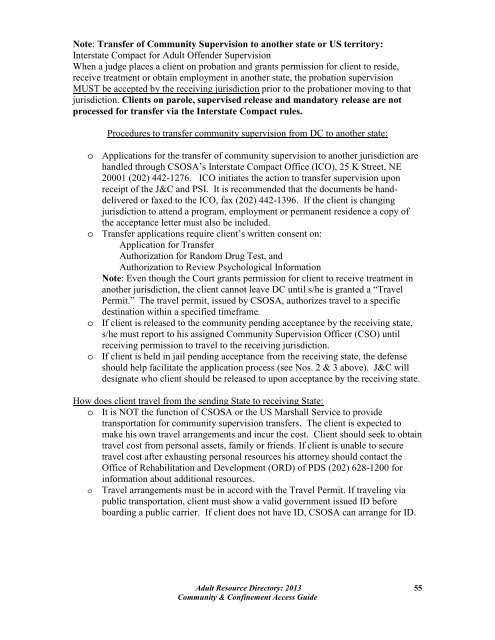Adult Directory 2013
Adult Directory 2013
Adult Directory 2013
You also want an ePaper? Increase the reach of your titles
YUMPU automatically turns print PDFs into web optimized ePapers that Google loves.
Note: Transfer of Community Supervision to another state or US territory:<br />
Interstate Compact for <strong>Adult</strong> Offender Supervision<br />
When a judge places a client on probation and grants permission for client to reside,<br />
receive treatment or obtain employment in another state, the probation supervision<br />
MUST be accepted by the receiving jurisdiction prior to the probationer moving to that<br />
jurisdiction. Clients on parole, supervised release and mandatory release are not<br />
processed for transfer via the Interstate Compact rules.<br />
Procedures to transfer community supervision from DC to another state:<br />
o Applications for the transfer of community supervision to another jurisdiction are<br />
handled through CSOSA’s Interstate Compact Office (ICO), 25 K Street, NE<br />
20001 (202) 442-1276. ICO initiates the action to transfer supervision upon<br />
receipt of the J&C and PSI. It is recommended that the documents be handdelivered<br />
or faxed to the ICO, fax (202) 442-1396. If the client is changing<br />
jurisdiction to attend a program, employment or permanent residence a copy of<br />
the acceptance letter must also be included.<br />
o Transfer applications require client’s written consent on:<br />
Application for Transfer<br />
Authorization for Random Drug Test, and<br />
Authorization to Review Psychological Information<br />
Note: Even though the Court grants permission for client to receive treatment in<br />
another jurisdiction, the client cannot leave DC until s/he is granted a “Travel<br />
Permit.” The travel permit, issued by CSOSA, authorizes travel to a specific<br />
destination within a specified timeframe.<br />
o If client is released to the community pending acceptance by the receiving state,<br />
s/he must report to his assigned Community Supervision Officer (CSO) until<br />
receiving permission to travel to the receiving jurisdiction.<br />
o If client is held in jail pending acceptance from the receiving state, the defense<br />
should help facilitate the application process (see Nos. 2 & 3 above). J&C will<br />
designate who client should be released to upon acceptance by the receiving state.<br />
How does client travel from the sending State to receiving State:<br />
o It is NOT the function of CSOSA or the US Marshall Service to provide<br />
transportation for community supervision transfers. The client is expected to<br />
make his own travel arrangements and incur the cost. Client should seek to obtain<br />
travel cost from personal assets, family or friends. If client is unable to secure<br />
travel cost after exhausting personal resources his attorney should contact the<br />
Office of Rehabilitation and Development (ORD) of PDS (202) 628-1200 for<br />
information about additional resources.<br />
o Travel arrangements must be in accord with the Travel Permit. If traveling via<br />
public transportation, client must show a valid government issued ID before<br />
boarding a public carrier. If client does not have ID, CSOSA can arrange for ID.<br />
<strong>Adult</strong> Resource <strong>Directory</strong>: <strong>2013</strong><br />
Community & Confinement Access Guide<br />
55


